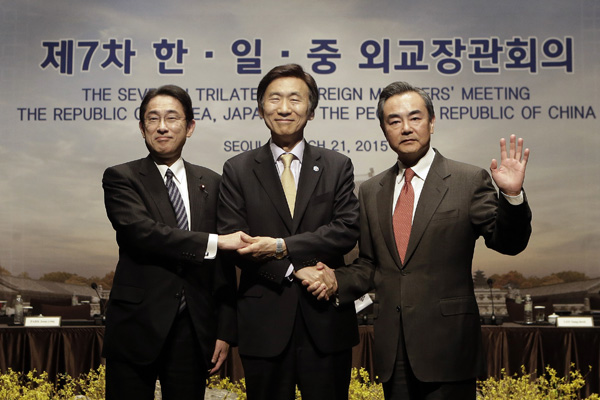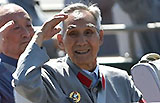Hopes rise for trilateral summit to resume
By ZHANG YUNBI (China Daily) Updated: 2015-09-15 07:14Leaders from China, the ROK and Japan could end stalled dialogue
Hopes are growing for a trilateral summit to be held before the end of this year involving leaders from China, the Republic of Korea and Japan, according to observers.
A Chinese diplomat said trilateral cooperation will be taken to "a new height" if the summit takes place.
 |
|
From right, Chinese Foreign Minister Wang Yi, South Korean Foreign Minister Yun Byung-se and Japanese Foreign Minister Fumio Kishida pose during the 7th trilateral foreign ministers' meeting in Seoul, South Korea, March 21, 2015. [Photo/IC] |
The diplomat was speaking on Sunday, when deputy agriculture ministers from the three countries met in Tokyo and reached consensus on issues including food security and disaster relief.
Although collaboration between the three countries has suffered from Japan's chilly relationship with the other two, foreign ministers from the three nations met in March and pledged an "early start" on the summit, which was last held in May 2012.
Observers said the three countries have a shared belief in controlling and tackling thorny issues such as those related to history.
Yang Houlan, a veteran Chinese diplomat who heads the Trilateral Cooperation Secretariat, a China-Japan-ROK cooperation body based in Seoul, told Yonhap news agency: "If the summit goes ahead, I think it will be a very important meeting. It will open a new route for trilateral cooperation and push this cooperation to a new height.
"I think especially that for cooperation among the governments, mutual understanding is very important. I think China and the ROK face the same challenges in how to face history," Yonhap quoted Yang as saying.
A meeting between diplomats at deputy director-general level is believed to be taking place on Wednesday to discuss preparations for the summit, according to a media briefing by ROK Foreign Ministry spokesman Noh Kwang-il on Sept 8, Japan's Kyodo News agency reported.
Guo Yanjun, deputy director of the Institute of Asian Studies at China Foreign Affairs University, said trilateral practical cooperation has not been halted during the three years in which discussions have stalled.
"With ministerial-level meetings having been resumed gradually in the past year, a resumption of the leaders' summit before the end of this year may not be surprising. ... The summit, if realized, will provide a further major boost for practical cooperation," Guo added.
Economic issues, trade and culture may be high on the agenda, and discussions are expected to touch on the widely expected trilateral Free-Trade Agreement, which has been affected by the stalled discussions, Guo said.
Analysts have speculated that the sixth trilateral summit will probably be attended by Premier Li Keqiang, ROK President Park Geun-hye and Japanese Prime Minister Shinzo Abe.
Park told Li at a meeting in Beijing on Sept 2 that Seoul is ready to boost communication and coordination with parties including Beijing to "achieve an early start" to the leaders' summit.
Li said the trilateral cooperation plays a significant role in boosting regional economic integration.
Zhang Jingquan, a professor of Northeast Asia studies at Jilin University in Changchun, said cooperation between Beijing and Seoul has taken a lead among the three nations, which are "faced with an unprecedented opportunity for diplomacy".
Li Peilin, vice-president of the Chinese Academy of Social Sciences, said in August that the three countries are "expected to become the leading forces championing peace and development of the region".






